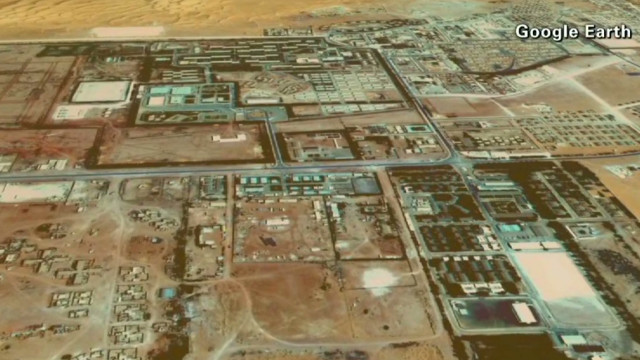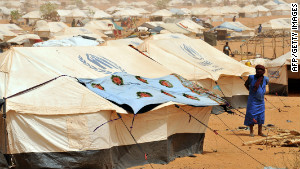January 17, 2013 -- Updated 1332 GMT (2132 HKT)

Baer: 'Dangerous radical' took Americans
STORY HIGHLIGHTS
- NEW: U.S. official: "It's too early for us to do anything"
- NEW: Hollande confirms the presence of French citizens at the site, but not hostages
- EU decides to establish training mission in Mali
- Americans, Japanese and Britons are among the hostages, officials say
The BP gas field is 60 kilometers (40 miles) west of the Libyan border and 1,300 kilometers from the Algerian capital, Algiers.
"The authorities do not
negotiate, no negotiations," Algerian Interior Minister Diho Weld
Qabliyeh said on state television after confirming the demands Wednesday
night. "We have received their demands, but we didn't respond to them."
Media in the region
reported that the attackers issued a statement demanding an end to
"brutal aggression on our people in Mali" and cited "blatant
intervention of the French crusader forces in Mali."
Map: In Amenas, Algeria
 Rogers: Mali is the 1st victim of Libya
Rogers: Mali is the 1st victim of Libya
The militants said they
carried out the operation Wednesday in Algeria because it allowed French
forces to use its air space in attacking Islamist militants in Mali.
The fallout escalated after rebels kidnapped the Westerners, dragging governments beyond Africa into a daunting insurgency.
"The situation on site
remains unresolved and fragile," BP said in a statement. "Armed groups
still occupy the site and hold a number of site personnel. "
During the attack on the gas plant in the desert, kidnappers killed two people, including a British national.
Hostages included
Americans, Japanese and Britons, according to officials from those
nations, who did not provide the number of people seized.
The group kidnapped Algerians as well, but they were all released Wednesday, the interior minister told state media.
The rush of events sent governments scrambling to account for workers in the region as questions raged on the attacks.
Japan and the United Kingdom sent officials to Algeria to get the latest information.
Ireland said there were
reports that one of its citizens was involved. French President Francois
Hollande confirmed the presence of French citizens at the site but
would not say if any of them were hostages.
"I will not give any
precision on the number of French citizens who could be held hostage.
What counts now is to allow the Algerians to free them," he said.
The U.S. State
Department said it is still working to determine how many citizens were
involved. American hostages could be as few as three, two U.S. officials
said Wednesday.
A U.S. rescue attempt
would require the permission of the Algerian government, and it has not
yet made a request for American help, a U.S. official told CNN Thursday.
So far, the crisis is
viewed as an "internal situation for Algeria," said the official, who
emphasized that Algerian security forces have successfully handled
internal threats.
The United States has
been working through the Algerians to help resolve the crisis. There is
not yet enough information to understand the situation on the ground,
the official said.
"It's too early for us to do anything," he said, adding that more solid information is needed on the situation.
Some hostages flee
Algeria's state media
reported that all its nationals who had been held hostage were free:
some had fled, while others were released.
All the hostages still detained are foreigners, the interior minister said.
The man behind the group claiming responsibility for the attack and kidnappings is a veteran jihadist known for seizing hostages.
Moktar Belmoktar, an
Algerian who lost an eye while fighting in Afghanistan in his teens, has
long been a target of French counter-terrorism forces. Libyan sources
said he spent several months in Libya in 2011, exploring cooperation
with local jihadist groups and securing weapons.
The attackers put the
number of hostages at "more than 40," including seven Americans, two
French, two British and other Europeans. Another Islamist group told the
Mauritanian News Agency there were 41 "Westerners."
However, the Algerian Press Service reported that "a little more than 20 foreign nationals are held hostage."
'Terrorist attack'
U.S. Defense Secretary Leon Panetta, in Europe meeting with NATO allies, called the incident in Algeria "a terrorist attack."
As world powers scramble
to limit the fallout, the United States is reviewing requests for
support from the French in their operation in Mali, but no decisions
have been made on specifics, said State Department spokeswoman Victoria
Nuland.
Last week, French troops
and warplanes joined Malian government forces to battle Islamist
militants, who have seized most of the African nation's northern region.
France, the former
colonial power in Mali, said it has committed about 1,700 troops to
Operation Serval, including about 800 on the ground there.
Europe's largest powers
appeared united in their goal of removing al Qaeda-linked militants from
the West African nation, where Islamist rebels are fighting to form
their own territory in the north.
Nations have pledged to
contribute transport planes, including Germany, Belgium and Canada.
Others, such as Italy, are promising "logistical support" for the
operation.
EU to help Mali's army
European Union foreign
ministers Thursday agreed on a mission to train Mali's army, the EU
said. It will include instructors, support staff and force protection
over a 15-month period. The agency has said about 450 non-combat troops
will be launched, hopefully by next month. The mission was established
after Malian authorities requested help.
Hollande has said it was a "necessary decision" to go into the country.
"The fight against
terrorism has no borders, it affects us all. What we are doing in Mali
is not simply linked to this country. There are terrorist networks
which, following what happened in Libya last year, have installed
themselves in a large part of West Africa and are trying to destabilize
the area and are involved in trafficking. Our duty is to put an end to
this and France assumes its responsibility," he said Thursday.
Hollande stressed that France was in Mali at the request of its government and within the framework of international law.
Mali was one of the most
successful democracies in Africa until a coup toppled the president
last year, leading the Islamists to capitalize on the chaos to establish
themselves in the north.
In the quest to
establish Sharia law, they have killed and mutilated residents who
disobeyed them, leading the International Criminal Court to launch a
war-crimes investigation.
Mali's government asked the U.N. tribunal to investigate in July, after Islamists seized much of the country, the court said.
No comments:
Post a Comment